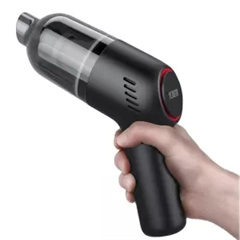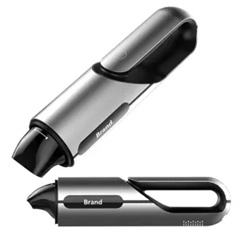HEPA (High-Efficiency Particulate Air) filters in vacuum cleaners are designed to trap and remove tiny particles from the air, including dust mites, pollen, pet dander, mold spores, and other allergens. These filters are an essential feature for individuals with allergies, asthma, or anyone who wants to improve indoor air quality. Here’s a closer look at HEPA filters in vacuum cleaners:
- Filtration Efficiency: HEPA filters are known for their high filtration efficiency. To be classified as a true HEPA filter, it must remove at least 99.97% of particles that are 0.3 micrometers (μm) in size or larger. This standard is set by the U.S. Department of Energy.
- Particle Size: While HEPA filters are exceptionally effective at capturing very small particles, they are also efficient at trapping larger particles like dust, dirt, and pet hair.
- Allergen Removal: HEPA filters are highly effective at removing common allergens, making them ideal for allergy sufferers. They can help reduce allergen levels in the air, creating a healthier indoor environment.
- HEPA Vacuum Cleaners: Vacuum cleaners that advertise HEPA filtration typically use HEPA filters in their design. These filters are often found in both upright and canister vacuum cleaners.
- Sealing and Filtration: For a vacuum cleaner to be truly effective at capturing allergens, it should not only have a HEPA filter but also be designed with a sealed system. A sealed system prevents air from bypassing the filter and ensures that all air passing through the vacuum is filtered.
- HEPA-Type Filters: Some vacuum cleaners use HEPA-type or HEPA-style filters, which are not true HEPA filters but offer some level of filtration. While they may be effective at trapping larger particles, they are generally less efficient at capturing very small allergenic particles.
- Maintenance: HEPA filters need regular maintenance. Check the manufacturer’s recommendations for your specific vacuum cleaner model. Some filters are washable, while others need to be replaced periodically.
- Cost: Vacuum cleaners with HEPA filtration tend to be more expensive than those without. However, the improved air quality and allergy relief they provide can make them a worthwhile investment for many individuals.
- HEPA Filters and HEPA Bags: Some vacuum cleaners use both a HEPA filter and HEPA bags. The HEPA bag traps particles before they reach the filter, extending the filter’s lifespan and reducing the frequency of filter replacements.
- Performance: Vacuum cleaners with HEPA filtration can perform just as well, if not better, than models without HEPA filters. They are capable of deep cleaning carpets and effectively removing allergens from various surfaces.
When choosing a vacuum cleaner with a HEPA filter, it’s essential to consider other factors as well, such as the vacuum’s power, maneuverability, and attachments. The combination of an efficient vacuum cleaner and a HEPA filter can help maintain a cleaner and healthier home, especially for those with allergies or respiratory sensitivities.


















